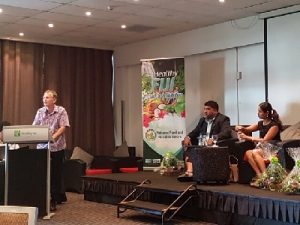Improving Food and Nutrition Security in Fiji is not just about agriculture, stakeholders agree
January 24, 2019

Suva, Fiji. Fiji needs to revaluate how malnutrition is addressed, both in terms of planning and capacity implementation, while emphasising the interplay and key role of agriculture, health, education, trade and other sectors, according to the participants in a multi-sectoral seminar on Food and Nutrition Security.
The Acting Permanent Secretary for the Ministry of Health, Ms. Susan Kiran, opened the two-day seminar on “Multisector Dialogue on Food and Nutrition Security in Fiji” highlighting the need to endorse and launch the Fiji Policy on Food and Nutrition Security as indicative of the national commitment to a multi-sectoral collaboration that calls for the full engagement and participation of all sectors – ministries, agencies and across all population groups in Fiji.
The Permanent Secretary for the Ministry of Agriculture, Mr. David Kolitagane, referred to the last nutrition figures from Fiji and acknowledged the importance of addressing the malnutrition problem, which is quite complex and multi-sectoral in nature, through complementary interventions and from multiple perspectives.
The latest data from the 2015 National Nutrition Survey (NNS) show that malnutrition in all its forms is still a major problem in Fiji. The prevalence of overweight, obesity and related non-communicable diseases are increasing while undernutrition and micronutrient deficiencies persist.
“Food and nutrition insecurity constitutes a major global challenge in the fight against hunger and poverty. A multi-sectoral approach aimed at mainstreaming the thematic areas into national policies and programmes will enhance nutrition and food security, boost people's resilience to food crises and help increase agricultural growth'', said Mr. Christoph Wagner- Head of Cooperation at the EU Delegation for the Pacific. Mr. Wagner further added that the seminar provided an excellent platform for sectoral stakeholders and partners to share their experiences, build capacities and keep up with the momentum related to the next phase of policy implementation.
“A driver of the nutrition situation in our country is that our current food systems do not provide the healthy diets needed for optimal health and wellbeing”, said the Assistant FAO Representative for Fiji, Ms. Joann Young. “By working with food systems, on the way food is produced, collected, stored, transported, transformed and distributed, greater results on improving diets and health can be achieved. Nutrition-sensitive agriculture and food systems is an approach that seeks to maximise agriculture’s contribution to nutrition” she noted.
The two-day “Multisector Dialogue on Food and Nutrition Security in Fiji” seminar, hosted by the Ministries of Agriculture and Health and Medical Services. The event took place last week in Suva, Fiji and was supported by the European Union (EU) and the Food and Agriculture Organization of the United Nations (FAO),
The seminar focused on increasing awareness of Food and Nutrition Security as core Government objectives; identifying corresponding sectoral roles and responsibilities; and facilitating collaboration and alignment across sectors for Food and Nutrition Security. The importance of nutrition in human development is also highlighted by the Sustainable Development Goals (SDGs), particularly Goal 2; End hunger, achieve food security and improved nutrition, and promote sustainable agriculture.
The event also provided a platform for knowledge exchange on the relationship between nutrition, agriculture and food systems. Besides the Ministry of Agriculture and the National Food and Nutrition Centre from the Ministry of Health and Medical Services, the seminar also tapped into the expertise of some of other key participants such as the ministries of Economy, Defence and National Security, Education, Heritage and Arts, Industry, Trade and Tourism, and Ministry of Women, Children and Poverty Alleviation to assimilate data on the best way forward in addressing nutritional challenges in Fiji.
The Seminar was part of the Food and nutrition security Impact, Resilience, Sustainability and Transformation (FIRST) programme, a strategic partnership between the EU and the FAO which provides policy assistance to countries in driving their own policy agenda to incorporate food and nutrition security and sustainable agriculture objectives into their national frameworks and budgets.
FIRST Policy Officer for the Pacific, Ms. Itziar Gonzalez, highlighted the importance of integrated solutions to combat malnutrition, emphasizing that the food and agriculture sectors are uniquely positioned to provide solutions that are based on an understanding of the multi-sectorial causes of malnutrition.
-End-
